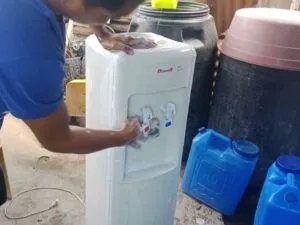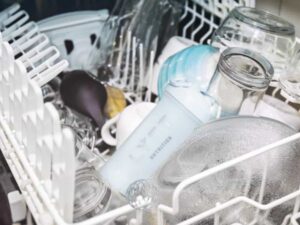Is Water Dripping From AC Dangerous? FULL Guide 2023

Air conditioners play a crucial role in keeping our indoor environments comfortable during scorching summers. However, sometimes we might notice water dripping from our AC units, which can be a cause for concern. In this article, we will explore the reasons behind water leakage from ACs and Is Water Dripping From AC Dangerous…
Contents
- 1 The Role of Condensate Drainage
- 2 Common Reasons for Water Dripping from AC
- 3 Potential Risks of Water Leakage
- 4 Impact on Indoor Air Quality
- 5 Electrical Hazards and Short Circuits
- 6 Structural Damage and Mold Growth
- 7 Health Concerns and Allergens
- 8 Detecting Water Leakage from AC
- 9 Regular Maintenance and Prevention
- 10 Importance of Proper Installation
- 11 DIY vs. Professional AC Repairs
- 12 Steps to Address Water Leakage
- 13 Cleaning and Unclogging the Drainage System
- 14 Repairing Faulty Components
- 15 Managing Humidity Levels
- 16 Using Secondary Drain Pans and Safety Float Switches
- 17 Consulting HVAC Professionals
- 18 Conclusion (Is Water Dripping From AC Dangerous)
- 19 FAQs (Is Water Dripping From AC Dangerous)
- 19.1 1. How can I detect water leakage from my AC unit?
- 19.2 2. Can water leakage from the AC lead to mold growth?
- 19.3 3. Is it safe to fix AC water leakage issues by myself?
- 19.4 4. What steps can I take to prevent water dripping from my AC?
- 19.5 5. Are there any health risks associated with water leakage from the AC?
Understanding Air Conditioners and Condensation
Air conditioners work by cooling the air and removing excess humidity. As warm air passes through the evaporator coils, moisture in the air condenses on the coils, creating water droplets. This process is called condensation, and the resulting water needs to be drained away from the AC unit.
The Role of Condensate Drainage
Condensate drainage is a critical component of air conditioning systems. It involves a drip tray, drain line, and a pump in some cases, all of which work together to direct the condensed water away from the AC unit and prevent it from pooling inside the system.

Common Reasons for Water Dripping from AC
Several factors can lead to water leakage from an AC unit. These include clogged drain lines, frozen evaporator coils, dirty air filters, and low refrigerant levels. Identifying the specific cause is essential in addressing the issue effectively.
Potential Risks of Water Leakage
Water dripping from the AC can pose various risks, affecting both the environment and the health of occupants. These risks include electrical hazards, structural damage, mold growth, and health concerns due to allergens and poor indoor air quality.
Auto Amazon Links: No products found. No products found. http_request_failed: A valid URL was not provided. URL: https://ws-na.amazon-adsystem.com/widgets/q?SearchIndex=All&multipageStart=0&multipageCount=20&Operation=GetResults&Keywords=Is+Water+Dripping+From+AC+Dangerous%3F+FULL+Guide+2023|Is+it+OK+to+use+AC+if+water+is+leaking%3F|Home+appliances|Is+Water+Dripping+From+AC+Dangerous|SAMSUNG+Galaxy+S23+Ultra+5G&InstanceId=0&TemplateId=MobileSearchResults&ServiceVersion=20070822&MarketPlace=US Cache: AAL_9cfe8463ddd8c3eb7e96dec50c1d9081
Impact on Indoor Air Quality
Accumulation of moisture from AC water leakage can create a breeding ground for mold, mildew, and bacteria. These airborne contaminants can degrade indoor air quality, leading to respiratory issues and allergies among occupants.
Electrical Hazards and Short Circuits
If water comes into contact with electrical components of the AC unit, it can cause short circuits, electrical malfunctions, and even fires. This poses a severe risk to both the AC system and the safety of the occupants.

Structural Damage and Mold Growth
Water leakage can damage walls, ceilings, and other structural components of the building. Additionally, if left unaddressed, the moisture can promote mold growth, which not only damages surfaces but also poses health risks.
Health Concerns and Allergens
Mold, mildew, and bacteria thrive in damp environments, and when released into the air, they can cause respiratory problems, allergies, and other health issues, especially for individuals with pre-existing conditions.
Slip and Fall Accidents
Pooling water from AC leakage can create slippery surfaces, increasing the risk of slip and fall accidents, especially in commercial settings.
Auto Amazon Links: No products found. No products found. http_request_failed: A valid URL was not provided. URL: https://ws-na.amazon-adsystem.com/widgets/q?SearchIndex=All&multipageStart=0&multipageCount=20&Operation=GetResults&Keywords=Is+Water+Dripping+From+AC+Dangerous%3F+FULL+Guide+2023|Samsung+Galaxy+s23|Home+appliances|SAMSUNG+Galaxy+S23+Ultra+5G|SAMSUNG+Galaxy+S23+Ultra+Cell+Phone&InstanceId=0&TemplateId=MobileSearchResults&ServiceVersion=20070822&MarketPlace=US Cache: AAL_4aee383c92e74304ae2ccfe8cb84a863
AC Efficiency and Energy Wastage
A malfunctioning AC due to water leakage can cause decreased efficiency and higher energy consumption, leading to increased utility bills and a negative impact on the environment.

Detecting Water Leakage from AC
Detecting water leakage early is crucial to preventing potential damage. Signs of water leakage include water stains, musty odors, and unusual sounds coming from the AC unit.
Regular Maintenance and Prevention
Regular maintenance, such as cleaning air filters and checking drain lines, can prevent water leakage issues from arising. Timely inspections and tune-ups by HVAC professionals are essential.
Importance of Proper Installation
Proper installation of the AC unit ensures that the condensate drainage system functions effectively, reducing the chances of water leakage.
DIY vs. Professional AC Repairs
While some minor issues can be fixed with DIY methods, it is often safer and more effective to seek professional help for AC repairs, especially when dealing with water leakage.
Steps to Address Water Leakage
When faced with water dripping from the AC, specific steps can be taken to address the issue, depending on the root cause.

Cleaning and Unclogging the Drainage System
Regularly cleaning and unclogging the AC’s drainage system can prevent water from backing up and leaking inside.
Repairing Faulty Components
Identifying and repairing faulty components, such as a malfunctioning pump or a damaged drip tray, can eliminate water leakage.
Managing Humidity Levels
Using dehumidifiers and maintaining appropriate humidity levels in the indoor environment can reduce condensation and subsequent water leakage.
Using Secondary Drain Pans and Safety Float Switches
Installing secondary drain pans and safety float switches can act as backups to catch any water overflow and shut down the AC unit in case of a drainage issue.
Consulting HVAC Professionals
If unsure about the cause of water leakage or unable to address the issue independently, consulting HVAC professionals is essential to avoid further damage and ensure safe repairs.
Conclusion (Is Water Dripping From AC Dangerous)
Water dripping from an AC unit should not be ignored, as it can lead to various dangers and potential risks. Regular maintenance, proper installation, and timely repairs are vital in preventing water leakage and maintaining a safe and efficient air conditioning system.
FAQs (Is Water Dripping From AC Dangerous)
1. How can I detect water leakage from my AC unit?
Detecting water leakage from your AC unit is relatively easy if you know what signs to look for. Common indicators include water stains or puddles around the unit, musty odors, and unusual sounds coming from the AC. If you notice any of these signs, it’s essential to address the issue promptly to prevent further damage.
2. Can water leakage from the AC lead to mold growth?
Yes, water leakage from the AC can create a moist environment, providing ideal conditions for mold and mildew to thrive. Mold growth not only damages surfaces but also poses health risks, especially for individuals with respiratory issues or allergies. Regular maintenance and timely repairs can prevent mold growth and ensure a healthier indoor environment.
3. Is it safe to fix AC water leakage issues by myself?
While some minor AC issues can be fixed with DIY methods, it is generally safer and more effective to seek professional help when dealing with water leakage from the AC. HVAC professionals have the expertise and tools to identify and address the root cause of the problem, reducing the risk of further damage and ensuring the safety of your AC system.
4. What steps can I take to prevent water dripping from my AC?
Preventing water dripping from your AC involves regular maintenance and proper care. Some essential steps include cleaning or replacing air filters regularly, checking and unclogging the drainage system, and ensuring proper installation. Additionally, maintaining suitable indoor humidity levels can help reduce condensation and subsequent water leakage.
5. Are there any health risks associated with water leakage from the AC?
Yes, water leakage from the AC can pose health risks. Moisture can lead to the growth of mold, mildew, and bacteria, which can degrade indoor air quality. The presence of these contaminants in the air can cause respiratory problems, allergies, and other health issues, particularly for those with pre-existing conditions. Addressing water leakage promptly and maintaining good indoor air quality are crucial to mitigating these health risks.








